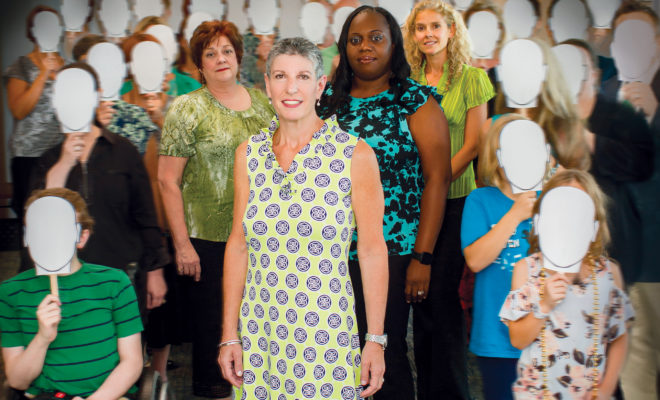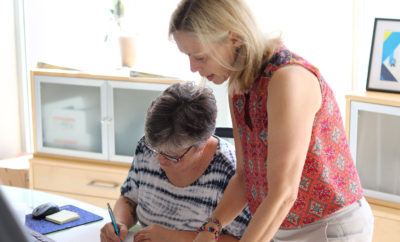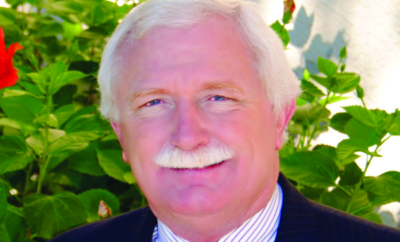
Philanthropy
JFCS’s Call to Action
Unmasking Mental Health Needs Across the Community
By Sylvia Whitman | Photo by Nancy Guth
Jewish Family & Children’s Service of the Suncoast (JFCS) is using the occasion of a $25,000 gift from an anonymous donor to launch not a new program but a new conversation—to unmask the myriad mental health challenges people face.
“Mental illness is our biggest issue,” says JFCS President/CEO Heidi Brown. It underpins most of the 40 or so intake calls that JFCS fields every workday. “It’s the biggest need, but also the biggest opportunity,” adds Brown. Society as a whole has overlooked mental illness and “grossly underfunded” treatment, she says. This conversation “is a call to action for the whole community.”
Mouse over the JFCS website, and icons pop up for services aimed at Youth and Seniors, Families and Veterans. But don’t mistake labels for silos. If a homeless ex-Marine walks through the door, JFCS looks beyond just finding a bed under a roof.
“We’ll peel back the layers of the onion, for every client and every family,” says Brown. Perhaps that vet is dealing with PTSD. Or she’s struggling with addiction. Relationships may have soured. Finding housing meets a short-term need but ignores the factors contributing to the crisis. “When we find the roots of the problem,” Brown says, “we’re able to address them.”
JFCS has broadened its outreach since its founding in the 1980s, but needs have broadened, too. “We receive referrals from just about any source you can think of—churches, temples, schools, doctors, other social service agencies,” as well as patients themselves, says Mary Bane Stevens, JFCS’s director of counseling services. The community vote of confidence keeps JFCS stretched.
“We do the best we can,” Stevens says. If JFCS can’t assist a client, it looks for a local partner that can.
In 2015, JFCS expanded beyond its main campus and satellite offices by opening the Gloria & Louis Flanzer Campus, the base for counseling and educational activities and the obvious hub for clients seeking mental health treatment. But because of internal referrals and an agency-wide awareness of trauma, “there’s no wrong door” to enter to get help, says Stevens.
All programs recognize that mental health challenges “occur in every walk of life, in every lifestyle, at any age,” she adds.
Mental Health Counseling
“Mental health is part of whole health—physical, spiritual, community,” says Karen Lord, JFCS’s supervisor of clinical programs. She oversees the one-on-one and group counseling sessions led by professional and intern therapists at the Flanzer Campus. “We want to normalize taking care of your mental health as part of taking care of your overall health.”
JFCS uses a “trauma-informed approach” to dealing with mental illness, explains Lord. A school may refer a child who’s acting out—stealing, fighting, running away. That’s a red flag for underlying trauma, so therapists listen and look for any life-altering event. It might be a loss of a beloved grandparent, a hostile divorce, bullying at school, abuse. “The question isn’t, What’s wrong with you?” explains Lord. “It’s, What happened to you?”
To those who might argue for leaving the past alone, Lord references the Adverse Childhood Experiences (ACE) study conducted by the Center for Disease Control and Prevention and Kaiser Permanente. In short, this major research found that adverse childhood experiences negatively affected a majority of participants across all demographic groups. The more bad experiences a person had, the more negative correlations followed in adulthood, from physical illness to underemployment, prison time, even early death.
“If you can help people address trauma,” says Lord, “you help them be more successful down the line.”
Although confidentiality prevents her sharing details, Stevens can sketch a typical JFCS success story that unfolded over a year. Referred by her primary care doctor, a young mother hobbled into a one-on-one counseling session on crutches, dogged by depression, anxiety, and insomnia. A physical injury had landed her in a back brace, unable to work, and she doubted her ability to parent her two young children, one of them “medically complex.”
Therapy is a “journey,” with goals set by clients, says Lord. Therapists help clients “come up with natural support systems. You could push your car down the street, but it’s so much easier with two or three people.”
Over time, the self-doubting mother began to see a future for herself. Physical and mental healing led to better relations with her children and a reassessment of her career goals. Back at work as an advocate for children with disabilities, she’s ready to return to school, confident of her ability to stay on top of her responsibilities.
Stigma once discouraged many people from seeking treatment, but public conversation has shifted, particularly in popular culture, says Lord. More awareness of mental illness, however, has stressed a national system unable to keep up with demand for services.
At times, JFCS also groans under its waiting lists. But because all JFCS programs address mental health, the agency can almost always steer clients to a beneficial experience. Partners in line for couples counseling might take a Healthy Families class in the interim, for instance. “We have that overlap,” Lord says.
JFCS has also embedded counselors (separate from the school system’s guidance counselors) at Booker Elementary, Booker Middle, McIntosh Middle, and Booker High School, giving families in those neighborhoods additional access to support.
Extending JFCS’s reach are the pool of graduate students and registered interns—about 15 at any one time—who learn and work alongside the licensed social workers and mental health counselors on staff. “We consider ourselves a training institute,” says Lord. Clients without insurance benefit not only from the evidence-based teaching environment but from reduced fees when they see trainees.
Although local universities (USF, FGC, National Louis) supply the most students, trainees travel from as many as 30 states and as far as California and New England. “At this point, we have more requests for internships than people who can supervise them,” Stevens says.
Off-Site Support
“We will see any child for any reason,” says Stevens. For children from families roiled by drug addiction, JFCS runs Camp Mariposa.
One weekend per month, kids gather at a campground with therapists, nurses, and peer mentors to discuss self-care and coping skills. “Often these kids are the ones in the household making adult decisions,” says CEO Brown. “They learn how to overcome this cycle of addiction … and they can work through the guilt, the shame, the embarrassment, and the feeling that no one else has these problems.” They also have fun—canoeing, dangling on rope courses, toasting marshmallows over a campfire, giggling in the dark in their cabins.
In safe, supportive space, kids can take off the mask they’ve created to protect themselves, says Karen Lang, supervisor of community based counseling programs. “Children impacted by family addiction experience a variety of challenges to include abandonment and neglect. Camp Mariposa helps to reduce the feelings of isolation. Campers learn they are not alone, and this is not their fault. Camp Mariposa teaches coping skills.” Children discover “what is mentionable is manageable,” she says.
JFCS’s youth camp for 9-12-year olds has been so successful that the agency has started a parallel teen camp.
Other youth-focused programs also intervene at key moments. JFCS’s Mobile Response Team (MRT) heads into the community to stabilize a crisis involving anyone between the ages of 0 and 25. Recently a school called: a student was cutting and told a friend goodbye—this was going to be his/her last day. The MRT showed up within the hour, Lang says, and evaluated the child using evidence-based cognitive behavior therapy techniques. The de-escalation worked: the child made a safety plan with therapists, adults informed the parents, and JFCS offered continuing services for 90 days.
And no one had to invoke the Baker Act, Florida’s law governing involuntary commitments. “Over the past two years, we’ve seen a 95% reduction in Baker Acts for clients who have successfully completed the MRT program who had a previous history of involuntary commitments,” says Lang. “With the high cost of hospitalizations, we’re saving money for families and taxpayers.”
Similarly, JFCS’s Adolescent and Diversion Program (ADAP) gives young people 11-17 who are at risk of involvement with the criminal justice system a second chance, says Lang. Youth involved in criminal activity ranging from shoplifting to assault may participate in targeted, evidence-based individual or group therapy and avoid handcuffs and a record. “This program is lifesaving,” says Lang.
Other JFCS prevention/intervention programs are community-based. JFCS runs Healthy Fathers classes on its campus—but also takes them into jails and residential treatment programs. With VIP-ER, a consortium of six agencies partner to provide services for Salvation Army residents who are struggling with substance abuse and related issues.
As part of its new conversation, JFCS wants to unmask that its every service, across the lifespan, involves prevention and intervention related to mental health. “The more that we can have open dialogue and resources to address these problems earlier, the better the outcomes,” says Brown.
FOR MORE INFORMATION on JFCS of the Suncoast, please visit jfcs-cares.org or call 941.366.2224






You must be logged in to post a comment Login